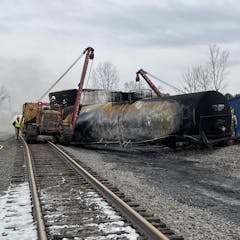
Articles on Volatile organic compounds (VOCs)
Displaying 1 - 20 of 21 articles

The science of smell is an exciting area of research.

Green plants produce a specific gas when under attack to both directly ward off herbivores and pathogens and indirectly lure in herbivore predators.

These pollutants can originate from many common household products – including vinyl flooring, plastic toys, cleaning products and furniture.

Wildfire smoke, even from fires far away, carries potentially harmful gases that, once inside, tend to stick around. An air quality specialist offers an easy, cheap, effective way to deal with it.

Human scent could one day be used as evidence in forensics and as diagnostic information in medicine.

It’s not just the ingredients we should be concerned about. The devices themselves release chemicals that end up in our blood and urine.

Manufacturers don’t usually have to disclose what’s in products like shampoo and household cleaners, but a new study finds that these products can contain hazardous ingredients.

The slow release of information about the chemical spill and results of air and water tests have left many questions about the risks and long-term impact.

There’s a lot of interesting science behind the fermenting, roasting, grinding and melting that turns chocolate into the bars, bonbons and baked goods you know and love.

A wave of infrastructure projects is coming as federal funds pour in. Cities and everyone in them needs to know the risks from the cheapest, most popular repair method and how to avoid harm.

Indoor air quality is affected by many things – and intentionally releasing a mix of chemicals is high on the list.

Noxious smells and blowing ash initially made the homes unlivable. But even after their homes were cleaned, some residents still reported health effects months later.

A new review of Australian asthma studies points the finger at three common household triggers.

Pinpointing the chemical compounds that make a fruit tasty to consumers can help producers breed for even more flavorful crops.

Dogs have such sensitive noses that they can be trained to detect the odors of crop pests, endangered species, illegal drugs – and diseases like COVID-19.

A new study shows how toxic chemicals like benzene are leaching into water systems after nearby fires. The pipes don’t have to burn – they just have to heat up.

The technician who gave you that shiny manicure may be inhaling dangerous levels of toxic chemicals on the job.

The microbes living in the soils around plant roots can help plants deal with a variety of stresses.

A PhD student in chemistry addresses some of the most common misconceptions about chemistry.

New research is spotlighting personal care products, such as shampoos and skin lotions, as a significant source of chemicals that contribute to urban air pollution.
